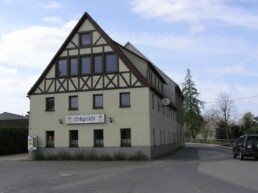BOARD 7 - THE RESTAURANT "ERBGERICHTS-GASTHOF"
The hereditary or feudal courts, also called „Schulzenlehn“, are antique and resemble a high-class group of farm properties. According to German federal law, the office of hereditary judge was appointed when the village was being created and usually attached to a large farm property. Often it was given to the locator and his decendants who was responsible for cultivating, surveying and distributing the subdued land. With the reception of the office of the hereditary judge the locator was remunerated for his services to the village’s foundation. Along with the office of the hereditary judge came the liquor licensing and brewing rights as well as the brandy distilling. This is how restaurants often received their name “Erbgericht” (engl. hereditary court) and still have it to this day. The hereditary judge could pass his office on to his descendants without any interference from the holder of the lower jurisdiction who often was the landlord. The today’s Inn is supposed to have been built in 1743. The chronicle, however, tells us that it had already burned down before in the years 1632 and 1639. The first Inn, however, must have already been built shortly after the foundation of Ruppendorf in the 13th and 14th Century. In 1820 the hereditary judge Carl Gottlieb Holfert split the property. The two farm properties “Beerwalder Straße 4” and Beerwalder Straße 13” were created (place list numbers 55 and 56; the numbers were given in an ongoing order, because at the time neither street names nor street numbers existed). In 1839 the aforementioned hereditary judge Holfer only remained the owner of the hereditary Inn to which belonged a small garden.
In 1850 the rear gable end was disassembled which included the big dance hall on the first floor. Approximately, at the beginning of 1880 until the end of the 1960s a butchery was located at the entrance of the “Beerwalder Straße”. From 1997 until 2000 the Inn was rebuilt and renovated.
In the recent past the Inn has been affectionately run by different families: Family Goldbach had shaped the Inn between 1978 until 1994, followed by Family Dietrich (1998-2010) and Family Huhn (2012-2017). Since 2020 Family Hartmann has been continuing the tradition. Today the Inn “Erbgericht” invites the local residents to spend time and the “Elferrat”, a carnival committee consisting of eleven members, celebrates, traditionally, its carnival events.

